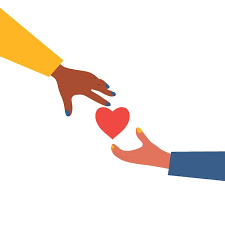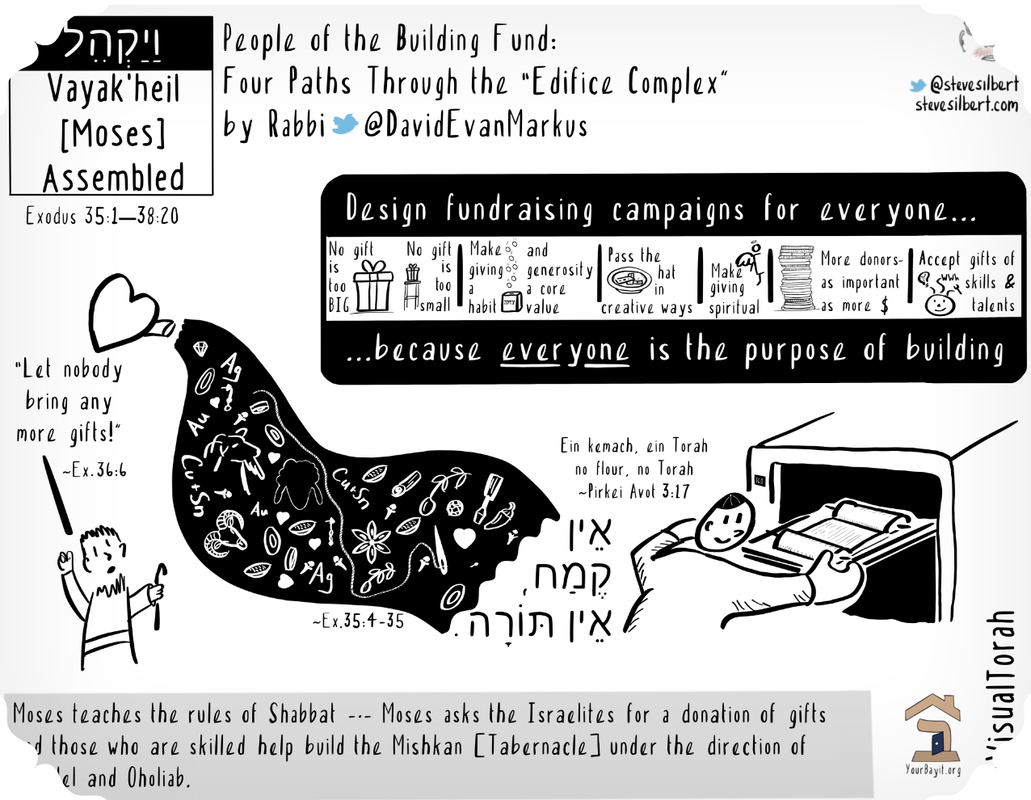| "Stop giving to the fund drive!" – said no community professional ever. Yet the hearts of our spiritual ancestors were so moved to support their central community institution, the building of the Mishkan, that everyone gave until their gifts overloaded the effort. Amidst so much spiritual, emotional and ethical wisdom, Torah shines a bright light on the kinds of generosity necessary to build vibrant community. There really is a Torah of generosity, and it aims at the heart. |

By Rabbi David Evan Markus
Parashat Vayakhel 5784 (2024)
By now, hopefully Shir Ami folks know that judicial ethics ban me from fundraising: I can't ever ask anyone to donate to a cause however worthy. Some rabbinic colleagues express to me a measure of good-hearted jealousy: they wish that fundraising weren't on their agenda.
Something deep-seated in the psyche instinctively recoils at fundraising: talk of money can leave folks in spiritual life feeling distracted, exhausted or dispirited. It's as if money is utterly incompatible with the kinds of emotional intimacy and trust we seek in spiritual community.
Yet we know that spiritual community lives or dies on generosity. As Pirkei Avot 3:17 puts it, אין קמח אין תורה (Ein kemah, ein Torah): "[If] there's no bread, there's no Torah." In the most practical ways, "dough" – not literal bread but the "dough" of funds – is necessary to raise up Torah. And in the same breath, and the same sentence of Pirkei Avot, the converse also is true: אין תורה אין קמח (Ein Torah, ein kemah): "[If] there's no Torah, there's no bread." Torah – and more broadly, values, wisdom and purpose – are what inspires people's generosity. As all fundraisers knows, there's this yin-yang to the art and call of giving. It's necessary, and it gives folks a great opportunity to do a mitzvah.
This week's Torah portion (Vayakhel) goes there directly. After the spiritual breaking that was the Golden Calf episode, it was time to build the Mishkan – a physical focus for awareness of the sacred Presence. But where to get supplies to build this shared heart of community? From the people, of course (Exodus 35:5):
Parashat Vayakhel 5784 (2024)
By now, hopefully Shir Ami folks know that judicial ethics ban me from fundraising: I can't ever ask anyone to donate to a cause however worthy. Some rabbinic colleagues express to me a measure of good-hearted jealousy: they wish that fundraising weren't on their agenda.
Something deep-seated in the psyche instinctively recoils at fundraising: talk of money can leave folks in spiritual life feeling distracted, exhausted or dispirited. It's as if money is utterly incompatible with the kinds of emotional intimacy and trust we seek in spiritual community.
Yet we know that spiritual community lives or dies on generosity. As Pirkei Avot 3:17 puts it, אין קמח אין תורה (Ein kemah, ein Torah): "[If] there's no bread, there's no Torah." In the most practical ways, "dough" – not literal bread but the "dough" of funds – is necessary to raise up Torah. And in the same breath, and the same sentence of Pirkei Avot, the converse also is true: אין תורה אין קמח (Ein Torah, ein kemah): "[If] there's no Torah, there's no bread." Torah – and more broadly, values, wisdom and purpose – are what inspires people's generosity. As all fundraisers knows, there's this yin-yang to the art and call of giving. It's necessary, and it gives folks a great opportunity to do a mitzvah.
This week's Torah portion (Vayakhel) goes there directly. After the spiritual breaking that was the Golden Calf episode, it was time to build the Mishkan – a physical focus for awareness of the sacred Presence. But where to get supplies to build this shared heart of community? From the people, of course (Exodus 35:5):
| קְח֨וּ מֵֽאִתְּכֶ֤ם תְּרוּמָה֙ לַיהו''ה כֹּ֚ל נְדִ֣יב לִבּ֔וֹ יְבִיאֶ֕הָ אֵ֖ת תְּרוּמַ֣ת יהו''ה זָהָ֥ב וָכֶ֖סֶף וּנְחֹֽשֶׁת׃ | Take from yourselves gifts to YHVH: each whose heart impel them will bring gifts for YHVH – gold, silver and copper. |
The list of building supplies went on – yarns and fabrics, all the physical stuff that would become the Mishkan. And "everyone" gave. So overwhelming was the generosity that God had to tell Moses (Exodus 36:6): "Let nobody bring any more gifts!" Would that any community, or any mission-based nonprofit, have Moses' problem of too much generosity!
The Torah of generosity seems so straightforward: "everyone" should give, from the "heart," by making "gifts to [God]," for the sake of the community's shared heart. Of course, we all know that often it's not so straightforward. Not everyone is blessed with abundance. Not everyone feels the impulse to give, or acts on it. Not everyone links generosity with serving the sacred. A lot of things can get in the way.
Torah wisely understands that, too. She isn't Pollyanna or impractical about the necessity and complexity of generosity. Instead, Torah and Jewish life harness emotional and spiritual truths to shape the practical realities of community giving.
First, Torah goes out of its way to say – not once but twice – that the recipient of our donations isn't the community or its leadership, but rather were "gifts to YHVH." Our ancestral gifts were for the purpose of manifesting God (spirit, meaning, holiness, ethics, rightness, goodness) in the world. So too today.
Second, Torah imagines two kinds of giving – this week's progressive n'div lev (heart-impelled generosity), and next week's flat-tax mandate on all adults. In this understanding, "everyone" gives something, and those whose hearts are moved to give more and who can give more are called to do so. This way, communities avoid the corrosion of what economists call free riding, with an ethic of generosity that everyone knows will inspire everyone without exception.
The Torah of generosity seems so straightforward: "everyone" should give, from the "heart," by making "gifts to [God]," for the sake of the community's shared heart. Of course, we all know that often it's not so straightforward. Not everyone is blessed with abundance. Not everyone feels the impulse to give, or acts on it. Not everyone links generosity with serving the sacred. A lot of things can get in the way.
Torah wisely understands that, too. She isn't Pollyanna or impractical about the necessity and complexity of generosity. Instead, Torah and Jewish life harness emotional and spiritual truths to shape the practical realities of community giving.
First, Torah goes out of its way to say – not once but twice – that the recipient of our donations isn't the community or its leadership, but rather were "gifts to YHVH." Our ancestral gifts were for the purpose of manifesting God (spirit, meaning, holiness, ethics, rightness, goodness) in the world. So too today.
Second, Torah imagines two kinds of giving – this week's progressive n'div lev (heart-impelled generosity), and next week's flat-tax mandate on all adults. In this understanding, "everyone" gives something, and those whose hearts are moved to give more and who can give more are called to do so. This way, communities avoid the corrosion of what economists call free riding, with an ethic of generosity that everyone knows will inspire everyone without exception.

Third, Jewish wisdom holds that a heart of giving will benefit not only community but also the donor, for the inner purpose of giving is to continue cultivating a generous heart. So spiritually and emotionally important is the act of giving that even those of us sustained by tzedakah must give to tzedakah (B.T. Gittin 7b).
Fourth, Jewish tradition holds that beyond one's minimum and voluntary physical (monetary) forms of generosity, volunteerism counts! Our ancestors needed not only generosity but also skill to build the Mishkan. Thus Torah recorded Moses to say (Exodus 35:10): "[L]et all among you who are skilled come and make all that YHVH commanded." Much the same is true today: most every faith community and mission-driven nonprofit thrives on volunteers.
We who are about building Jewish life, or community life in any form, know deep inside that it's always about putting people first. Tzedakah is part of that, to cultivate the heart of each person and the shared heart of community. The Torah of Giving is to democratize generosity, to teach and model universal giving as a core community mitzvah – a spiritual act that joins "learning" and "prayer" as Judaism’s three pillars (Pirkei Avot 1:2).
The Mishkan solicited everyone’s gifts, because “everyone” was the purpose of building. Today, that means you and me and all of us together who share a heart of generosity.
Fourth, Jewish tradition holds that beyond one's minimum and voluntary physical (monetary) forms of generosity, volunteerism counts! Our ancestors needed not only generosity but also skill to build the Mishkan. Thus Torah recorded Moses to say (Exodus 35:10): "[L]et all among you who are skilled come and make all that YHVH commanded." Much the same is true today: most every faith community and mission-driven nonprofit thrives on volunteers.
We who are about building Jewish life, or community life in any form, know deep inside that it's always about putting people first. Tzedakah is part of that, to cultivate the heart of each person and the shared heart of community. The Torah of Giving is to democratize generosity, to teach and model universal giving as a core community mitzvah – a spiritual act that joins "learning" and "prayer" as Judaism’s three pillars (Pirkei Avot 1:2).
The Mishkan solicited everyone’s gifts, because “everyone” was the purpose of building. Today, that means you and me and all of us together who share a heart of generosity.


 RSS Feed
RSS Feed